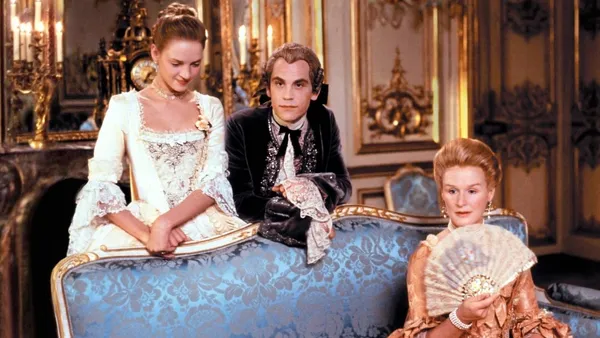Eye For Film >> Movies >> Dangerous Liaisons (1988) Film Review
Dangerous Liaisons
Reviewed by: James Benefield

Stephen Frears’ film, made at the end of the ‘Greed is Good’ Eighties, is not simply a deliciously dark warning about what happens with the unpleasant by-product of decadence; complete and utter ennui, and the consequences which follow. It’s also something more eternal and universal. It works equally well as a deeply traumatic depiction of a soured relationship, in some ways akin to Who’s Afraid Of Virginia Woolf?, made 25 years before.
Like Virginia Woolf, it’s also based on a play, and immediately betrays its stage origins with its depiction of the setting. The shenanigans of the late 18th century French aristocracy occur in stifling, oppressive interiors. This is perfect theatrical fodder. To make the wordy claustrophobia work in cinema, the movie requires excellent acting. Luckily, the bored, ageing misanthropes who play increasingly unpleasant psychosexual games with unsuspecting innocents, and each other, are Glenn Close (the Marquise de Merteuil) and John Malkovich (the Vicomte de Valmont).

The Marquise has been recently spurned, and requires the Vicomte to take revenge on the object of her scorn. This man, Gercourt, is planning a marriage with virtuous, virginal and God-fearing Cecile de Volanges (an almost mute Uma Thurman). The Marquise wants Cecile seduced, spoilt, before the wedding. With written proof, the Marquise will sleep with the Vicomte.
The Vicomte is confident that he’ll get to sleep with Volanges. He’s so confident, he sets himself another task to also fill his time; the seduction of one of the most luminous beauties in France, Madame de Tourvel (in a performance of perfectly pitched brittle strength by Michelle Pfeiffer). Also God-fearing, virtuous and virginal, Tourvel is further famous for her intelligence and her fussiness in regard to men. However, in the pursuit, the Vicomte finds himself falling love for the first time since his relationship with the Marquise. Sparks will fly.
Malkovich employs an exaggerated Boston drawl for the Vicomte, immediately setting himself apart from the other actors’ use of fairly neutral to mid-Atlantic tones. Yet, instead of becoming a victim of the Robin Hood: Prince of Thieves school of mismatched accent hilarity, it is a deliberately self-aware device that only adds to the film.
It’s part of another hangover from the story's theatrical origins. This is a film as much about appearance and performance as it is about love and sex. From the opening credits in which we see the leads get dressed for the day, applying make up (or, if you will, war paint) and adding to their occasionally bouffant hair, to the final few moments where, after being publicly disgraced, an important character removes her make-up, it’s about the relationship, and subtle differences, that exist between deceit and performance. Relationships in this world are not only war, they are to do with how much of ourselves we present to others.
Malkovich delivers a performance that is about performance; it’s something that would also work as well as on stage as it does on film; he swaggers into every scene, and acts in a highly contemporary way, not too dissimilar to Michael Douglas in the ultimate depiction of Eighties decadence, Wall Street, remaining entirely imperious throughout. The intelligence in the performance shows it is aware of itself, and also of the self-consciousness (coming in forms such as delightfully meaty metaphors and the occasional monologue) in the film’s writing and dialogue.
Meanwhile, Glenn Close’s face is an unreadable wall throughout the film. Emotion, usually only visible in the form of wry, self-satisfied smiles, even then rarely breaks its stony surface. This makes her eventual breakdown at the film’s end totally unexpected, and truly shocking. It is masterful, and although it isn’t a performance as aware of the piece’s stage origins as the one belonging to her co-star (mostly, due to Close’s subtlety which wouldn’t be registered by those in the cheap seats), it’s highly accomplished, and she’s a worthy match for Malkovich.
The centre of the film, however, is the relationship between the two leads, which is easily on par with Martha and George from Who’s Afraid Of Virginia Woolf? Although the pair think they are not a couple, and although both are frequently having sex with different people, the two might as well be together. They spend a lot of time together, are sexually attracted to each other and derive enjoyment, however sadistically, from each other’s activities. What seems to be preventing them from being together is unclear, and highly intriguing. It’s like a sinister version of the relationship between Mary Poppins and Burt the chimney sweep; there is clearly history between the two, but you are never told exactly what happens, and it almost kills you.
As the story glides gracefully from pitch-black comedy to complicated tragedy, you are in no doubt this is a film which happened at the right time in the careers of its two central stars, and for cinema. It’s a reflection of decadence, and perhaps of the Eighties, eating itself, and is every bit as unsavoury as that description sounds. It is also a showcase of two very fine performances; of two ripening stars who spark off each other in terms of ability and sexual chemistry. And, despite the occasionally tentative direction from Frears (he occasionally reverts into sub-Hitchcock imagery, such as his visual symbolism of mirrors and doubling) and the film not quite escaping its stage origins, it’s completely, totally, horribly compulsive.
Reviewed on: 10 Aug 2009


















